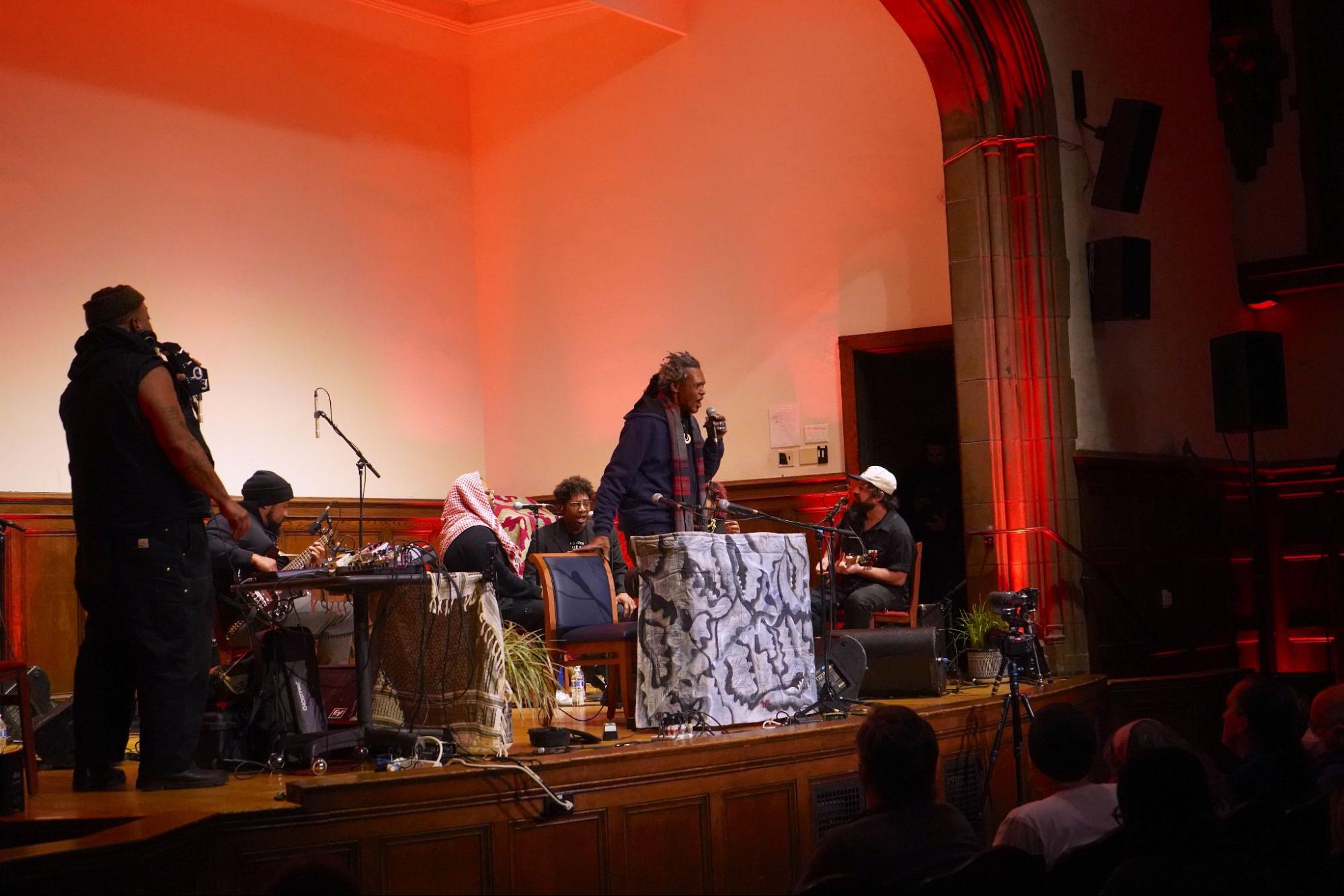Multidisciplinary artist and musician Lonnie Holley improvises a thought-provoking set with Mourning [A] BLKStar.
Lonnie Holley and Mourning [A] BLKStar perform in the Whitney Humanities Center for the CCAM Sound Art Series

Cody Skinner, Contributing Photographer
On Jan. 18, a live musical experiment unfolded as the lauded multi-talented artist, Lonnie Holley, and genre-bending Afrofuturist band Mourning [A] BLKstar, or M[A]B, took the stage in an improvisational soul-inspired performance. Holley’s manager, Matt Arnett informed audience members beforehand that the songs had not been heard before and would not be played again.
Holley and M[A]B performed their set of entirely new material in Yale’s Whitney Humanities Center as part of the Collaborative Arts and Media Sound Art Series. After the concert, Holley spoke with Ross Wightman, CCAM technical manager and series curator, and audience members about his life and art, even showcasing his recent wire sculpture depicting the faces and bodies of a multi-generational family.
“Lonnie is definitely the lead,” explained RA Washington, who performs on beat samplers for M[A]B, “but it’s all improvisational. Any background music or vocals that are created are created by us, Mourning [A] BLKstar.”
Holley found his calling for art while making sandstone graves for his nephew and niece after they passed away in a house fire. When Holley’s sister couldn’t afford tombstones, Holley used his grandfather’s cross-cut saw to carve the memorials himself. Ever since, Holley has integrated themes of compassion and investigated the human condition, as evidenced by the recurring motifs and subjects present throughout his creative work.
While he has made songs on his keyboard and microphone for a large part of his life, it took until 2012 for Holley to release his debut album “Just Before Music.”
Formed in Cleveland in 2015, M[A]B is a label-defying Black music collective. M[A]B members met Holley through his student and guitarist, Lee Bains, and connected with his passion for his art. The group never rehearsed with Holley prior to their performances. Now, they’re traveling on a concert tour together.
Washington said about the power of M[A]B and Holley’s collaboration: “There have been experiences that’ve been so spiritually powerful that it’s surprising, because that doesn’t happen. It does happen, but it doesn’t happen to this degree that it has on this particular tour.”
The concert was part of CCAM’s Sound Art Series, led by Wightman. Founded in 2020, the Sound Art Series, which existed online through the pandemic, is focused on highlighting the sonic arts by bringing on a diversity of guest artists who experiment with sound and performance. Sound Art Series shows are free and open to the public, including open discussions, inviting audience members to further engage in the presented art and artists.
“It’s about the performance, as much as it is about the art, as much as it is about the sound,” said Wightman, expressing his intention to showcase artists experimenting with sound in a broader way.
Holley began his set with the phrase, “Thank you, time,” establishing the auditory theme for the following composition. Many of the songs started with Holley feeding M[A]B single lines and piano chords to inspire their instrumentation.
This call-response style of music composition created a dynamic on-stage interaction where band members responded naturally to their own sounds. Every few minutes, the instrumentation would die down, allowing Holley to speak to the audience directly before moving on to his next sonic idea.
“It’s always a little bit of a clean slate,” said Latoya Kent, a vocalist for M[A]B. “It feels like every time a song leaves, then it’s gone. Now it’s a new clean slate, and we’re starting from that clean slate.
Members of M[A]B spoke highly of Holley and talked extensively about the trust they all have in each other musically.
When Holley gave out the instruction “no keys” during their performance, instantly, the keyboard responded. Such feedback was prevalent throughout the show, verbally and nonverbally as the musicians used their crafts to honor the greater performance.
“You never realize how divided your mind is until you meet a person like Lonnie,” said Washington. “So focused, he’s pure art — pure. Every inch of him bleeds through the prism of art, no matter what it is.”
Holley reciprocated admiration for the artists around him in a conversation with the News.
He spent time before his performance with students of the School of Art and the School of Architecture.
“What artists have in common is that we are all now being driven by spiritual emotions,” Holley said. “We may not even know it. We think that we have to get out and earn this and earn that, but everything that we’re trying to ‘re-earn’ has already been paid [for] by our ancestors’ sacrifice.”
Holley’s lyrics explore themes of resilience through hardship, the importance of heritage and the unavoidable passage of time. His journey to artistic prominence from an early life marked with adversity has given Holley many stories, thoughts and feelings to relay through his sculptural and musical work.
Holley and M[A]B have garnered cultural and critical acclaim for their work, as their music reflects the perspectives of unique life experiences. Their CCAM Sound Art Series performance gave attendees the opportunity to see a creative spin on what musical performances can be and witness how artists can react to their work as it is composed.
“There is nothing that I could write,” sings Holley in a song, pausing as if waiting for inspiration to strike again. When it does, he continues, “to make a wrong right.”
Lonnie Holley’s latest release, 2023’s “Oh Me Oh My,” was given a nine out of ten score from internet music critic, Anthony Fantano.







